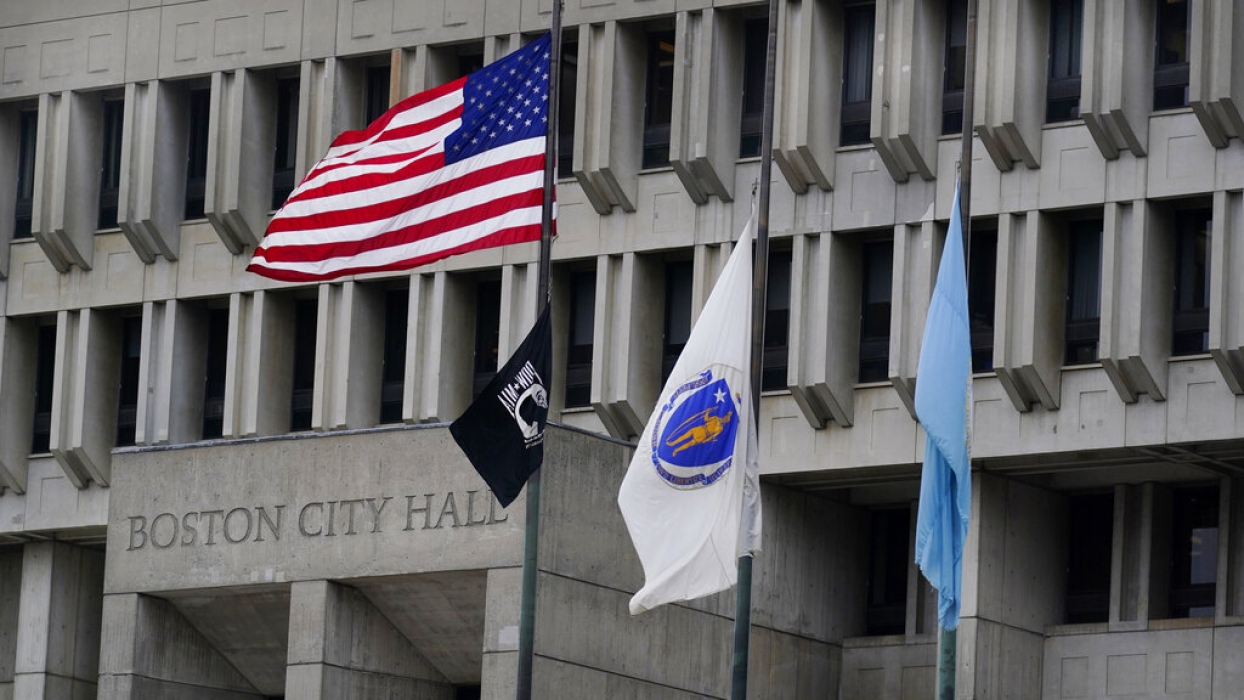In Shurtleff v. Boston, 596 U.S. ___ (2022), the U.S. Supreme Court ruled that Boston violated a private organization’s First Amendment religious free exercise rights by refusing to allow them to temporarily raise a Christian flag on a flagpole outside Boston City Hall, given that Boston had previously allowed various organizations to temporarily raise secular flags on the same flagpole.
The court’s ruling depended on its conclusion that, given Boston’s policies, temporarily raising a flag on this flagpole outside Boston City Hall was an act of private expression, not government speech.
The court’s decision was narrowly applied to the facts in this specific case. The court did not rule that as a general matter raising a flag on a flagpole outside a government building is an act of private expression. On the contrary, the court’s reasoning suggested that usually such acts are government speech.
Shurtleff asks to fly Christian flag on city flagpole
There are three flagpoles outside Boston City Hall. One flies the United States flag. Another flies the Massachusetts state flag. The third typically flies the Boston city flag. But for many years, Boston has allowed other groups to request to temporarily raise other flags on the third flagpole. Most of the flags have been those of other governmental entities or have been associated with a day of observance in Boston.
In 2017, Harold Shurtleff — on behalf of Camp Constitution, a private organization seeking to “enhance understanding” of the United States’ “Judeo-Christian moral heritage” — requested to temporarily fly “the Christian flag,” which is a flag used to represent Christianity by many Protestant churches and denominations in the U.S.
Citing concerns about violating the First Amendment’s establishment clause, Boston twice denied Shurtleff’s request. After the second denial, Shurtleff sued.
A U.S. district court and the 1st U.S. Circuit Court of Appeals ruled that Boston was permitted to deny Shurtleff’s request on the grounds that raising the flag was an act of government speech, not private expression, and thus, that Boston was entitled to selectively choose which messages it wanted to promote on its flagpole.
Court: Raising Christian flag was private expression, not government speech
In a unanimous decision, the Supreme Court reversed the lower courts’ decisions. The key reason why the court reversed was because it disagreed with the lower courts that temporarily raising the Christian flag would have been government speech, not private action.
Writing for the majority, Justice Stephen Breyer held that, given Boston’s policies and past practices of allowing many secular groups to temporarily raise flags, such flag raisings were acts of private expression. In reaching this conclusion, Justice Breyer appealed to previous cases dealing with the government speech doctrine, including Pleasant Grove v. Summum (2009), Walker v. Texas Division, Sons of Confederate Veterans (2015), and Matal v. Tam (2017).
In Pleasant Grove and Walker, the court relied on three key considerations in determining whether an act of expression counted as government speech:
- who has been speaking historically during similar acts of expression,
- who the public is likely to assume is speaking, and
- who controls the means of expression.
Breyer: Line between private expression forum, government speech not always clear
Justice Breyer relied on these same considerations in assessing whether temporarily raising a flag on Boston’s third flagpole was government speech or private expression. He claimed that this examination was part of a “holistic inquiry” and that the assessment was “not mechanical.”
Justice Breyer said that “the line between a forum for private expression and the government’s own speech is important, but not always clear.” In this case, he found that “some evidence favors Boston, and other evidence favors Shurtleff,” but that on balance the evidence favored Shurtleff’s position that such flag raisings were acts of private expression.
He concluded that because the flag-raising was an act of private expression, not government speech, Boston violated Shurtleff’s and Camp Constitution’s First Amendment right to religious free exercise. This is because Boston’s denial of Camp Constitution’s request amounted to constitutionally impermissible viewpoint discrimination that violated the First Amendment’s provision of freedom of speech.
Justice Breyer was joined by Chief Justice John Roberts and Justices Sonia Sotomayor, Elena Kagan, Brett Kavanaugh, and Amy Coney Barrett.
Justice Samuel Alito, joined by Justices Clarence Thomas and Neil Gorsuch, filed an opinion concurring in the judgment. Justice Alito argued that the court should adopt a narrower test for determining when something is an act of government speech, writing that “government speech occurs if — but only if — a government purposefully expresses a message of its own through persons authorized to speak on its behalf, and in doing so, does not rely on a means that abridges private speech.”
Gorsuch, Thomas argue for more historical understanding of church, state relationship
Justice Kavanaugh filed a brief concurrence in which he stated that the Boston city official who worried that Boston would violate the establishment clause by temporarily raising the Christian flag was mistaken.
Justice Gorsuch, joined by Justice Thomas, filed a longer concurrence arguing that Boston had erred in denying Camp Constitution’s request by implicitly relying on the sort of reasoning that had been put forward in the court’s Lemon Test for resolving establishment clause cases.
Justice Gorsuch argued instead for an originalist approach to the establishment clause that placed a greater emphasis on historical understandings about the relationship between religion and the state.
This article was published May 5, 2022. Mark Satta is assistant professor of philosophy at Wayne State University.

